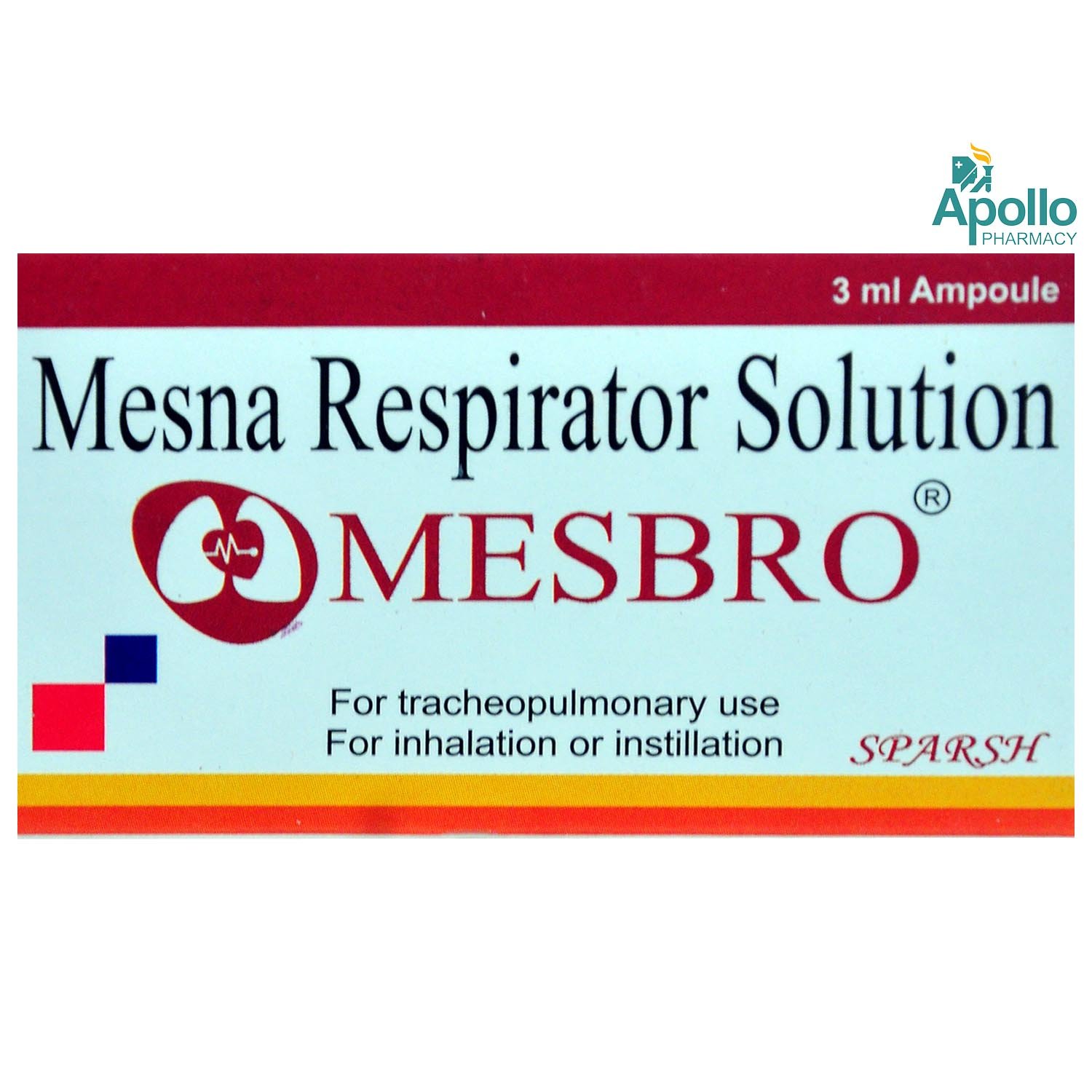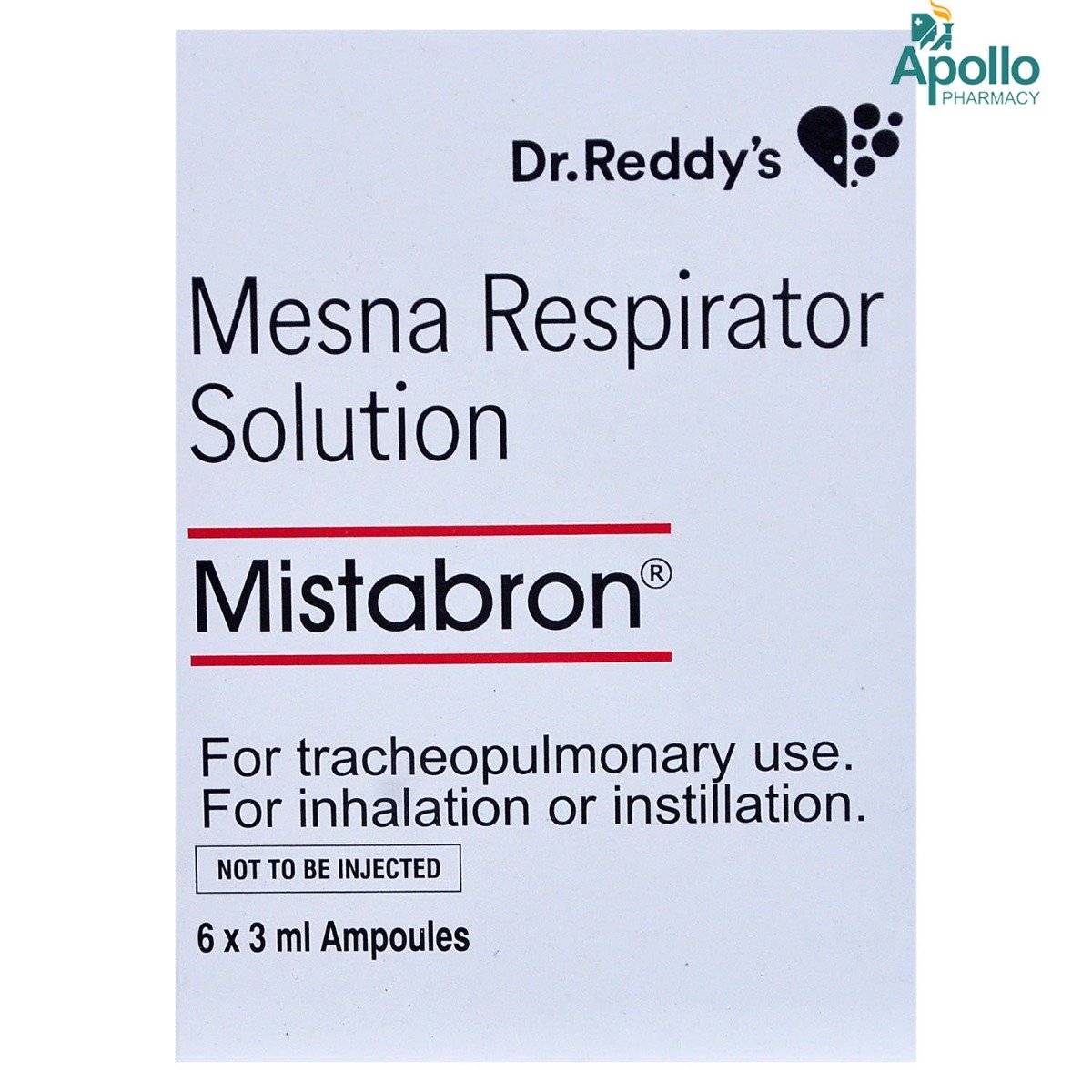Mesna
About Mesna
Mesna belongs to a class of medication known as 'cytoprotectant' primarily used to prevent Hemorrhagic cystitis (a condition that causes bleeding in the urine due to the effect of anticancer agents (Ifosfamide). Our body breaks down the anticancer agent (Ifosfamide) to form a chemical (acrolein) that can harm and irritate the bladder. Mesna reduces the risk of inflammation and bleeding in the bladder due to other anti-cancer medications.
Mesna contains 'Mesna', a chemo-protectant medicine that works by altering the breakdown of anti-cancer agents (Ifosfamide) found in the urine, thereby making it less toxic. Besides this, Mesna also protects the bladder from the harmful side effect of certain anticancer agents (like ifosfamide and cyclophosphamide) known as hemorrhagic cystitis (bleeding in the bladder).
Mesna parenteral preparation. It will be administered to your vein by a trained healthcare professional, hence do not self-administer. In some cases, this medicine may cause certain side effects such as nausea, vomiting, headache, flushing (sense of warmth in the face, ears, neck, and trunk), lethargy, rash, diarrhea, light-headedness, abdominal pain, flu-like symptoms, fever, and injection site reactions. Most of these side effects of Mesna do not require medical attention and gradually resolve over time. However, if the side effects are persistent, reach out to your doctor.
If you are allergic to Mesna or any of its constituents, you should avoid using it. In order to prevent conception in women of childbearing age, an effective birth control method should be used. Your doctor may advise routine urine and blood tests while you take Mesna to check your CBC (blood cell count). Because of various underlying clinical disorders, including thrombocytopenia, Mesna is contraindicated for usage in hematuria. While taking Mesna, consuming 1-2 litres of liquids daily is advisable. Due to significant adverse effects, this medication should be avoided by those who are pregnant or nursing; thus, see your doctor before using it.
Uses of Mesna
Medicinal Benefits
Mesna belongs to a class of medication known as 'chemoprotectant' primarily used to prevent bleeding into the urine by a particular anticancer medicine known as ifosfamide (ifosfamide-induced hemorrhagic cystitis). It also reduces the risk of inflammation and bleeding in the bladder receiving any anti-cancer medication. It contains Mesna, which works by reacting chemically with the urotoxic ifosfamide (anti-cancer medicines) metabolites, resulting in their detoxification. In addition, it binds to other urotoxic metabolites and inhibits their effects on the bladder.
Directions for Use
- Mesna can be taken with or without food, or as advised by the doctor.
- Follow your doctor’s recommendations on the dosage and timing of this medication to achieve optimal results.
- Swallow it as a whole with a glass of water.
- Do not crush, chew, or break it.
Storage
Side Effects of Mesna
- Nausea
- Headache
- Flushing (sense of warmth in the face, ears, neck and trunk)
- Lethargy
- Rash
- Diarrhea
- Lightheadedness
- Abdominal pain
- Flu-like symptoms
- Fever
Drug Warnings
Do not take Mesna if you are allergic to Mesna or any of its ingredients. Mesna injection or infusion should be done under the supervision of a doctor only. An effective birth control measure should be taken to avoid pregnancy in women of childbearing age. Also, maintain a minimum of 6 months gap between the last dose of Mesna taken and your next pregnancy. Regular urine and blood test should be done while taking $nma to monitor your CBC (blood cell count). Mesna is not indicated for use in hematuria due to other underlying pathological conditions like thrombocytopenia. Drinking at least 1 litre of fluid daily while taking Mesna is important. Mesna is known to cause blurry vision and dizziness, so do not drive or operate machinery.
Drug Interactions
-
Drug-Disease Interaction: Mesna is known to interact in patients with an autoimmune disorder like rheumatoid arthritis (pain and inflammation in the joints), systemic lupus erythematosus (a severe form of lupus in which pain and fatigue occur in joints), or nephritis (a type of kidney problem).
-
Drug-Food Interaction: Inform your doctor about all vitamins, and minerals you are taking.
-
Drug-Drug Interaction: Mesna is known to interact with anticoagulants (anisindione, dicumarol, warfarin).
Drug-Drug Interactions Checker List:
Safety Advice

Alcohol
cautionMesna if taken along with alcohol may increase drowsiness, so it should not be taken along with alcohol.

Pregnancy
cautionMesna is a category B pregnancy medicines. It has not shown any harm to the baby but should only be taken if a doctor prescribes you.

Breast Feeding
unsafeMesna should not be taken if you are breastfeeding as it is known to pass through the breast milk and harm the baby. Maintain a gap of 1 week after stopping Mesna before breastfeeding.

Driving
unsafeMesna is known to cause blurred vision and drowsiness. So, do not drive or operate machinery which requires concentration.

Liver
cautionLet your doctor know if you have any history of liver diseases before receiving Mesna. Your doctor will weigh the benefits and any potential risks before administering it to you.

Kidney
cautionLet your doctor know if you have any history of kidney diseases before using Mesna. Your doctor will weigh the benefits and any potential risks before prescribing it to you.

Children
cautionThe safety and efficacy of Mesna have not been established in children. Moreover, Mesna contains benzyl alcohol, which is known to cause a gasping syndrome in children.
Habit Forming
Diet & Lifestyle Advise
- Empty your bladder frequently in the first 24 hours of chemotherapy (cancer treatment). If any pain occurs during urination, let your doctor know it.
- Nausea can occur as a side effect of chemotherapy. Eat small and frequent meals to avoid it, or you can take any anti-nausea medicine.
- Sleep at least 8 hours a day and take plenty of rest.
- Maintain good nutrition. Eat home-cooked and freshly prepared food. Avoid junk, oily and spicy food.
Special Advise
- Regular blood and urine test are required while you are taking Mesna.
- Mesna may interfere with enzymatic creatinine phosphokinase (CPK) activity tests that use a thiol compound (N-acetylcysteine) for CPK reactivation. This may result in a falsely low CPK level. Inform your doctor about the use of Mesna.
- Mesna may interfere with a certain laboratory test (for urinary ketones), possibly causing false test results. Make sure laboratory personnel, and all your doctors know you use this drug.
Patients Concern
Disease/Condition Glossary
Ifosfamide-induced Hemorrhagic cystitis: It is a condition that causes bleeding in the urine due to the effect of anticancer agents (Ifosfamide). It occurs when an individual undergoes planned chemotherapy (for cancer treatment). During chemotherapy, an anticancer medication called 'ifosfamide' causes inflammation and bleeding of the bladder, which is passed into the urine. The colour of urine may vary from pink to red in colour.
FAQs
Mesna is used to prevent Hemorrhagic cystitis (a condition that causes bleeding in the urine due to the effect of anticancer agents (Ifosfamide). It reduces the risk of inflammation and bleeding in the bladder due to other anti-cancer medications.
Our body breaks down the anticancer agent like ifosfamide or cyclophosphamide to form a chemical known as acrolein, that can harm and irritate the bladder. Mesna works by making this natural chemical less harmful or toxic. However, Mesna does not change ifosfamide's anti-cancer effects.
No, Mesna should not be taken along with anti-coagulant like warfarin, heparin or coumarin as it might increase the risk of bleeding and lead to serious complications.
An autoimmune disorder is a condition in which the immune system attacks healthy parts of the body and causes pain, swelling, and damage. Some of the autoimmune disorders are rheumatoid arthritis, systemic lupus erythematosus or nephritis.
If you observe any change in the urine colour (like if you have red/pink-coloured urine), please inform your doctor.
In addition to the bladder bleeding in hemorrhagic cystitis, an individual might also experience bladder wall scarring, decreased size (atrophy) of the bladder, and severe systemic infection (urosepsis) and urinary obstruction.
No, Mesna is not a chemotherapy or cytotoxic drug.
Use of Mesna in patients with used in patients with overactive immune system (rheumatoid arthritis, lupus, nephritis) may increase your risk for a Mesna allergy.
Gasping syndrome is a life-threatening condition in neonates characterized by multi-system failure and death following the administration of benzyl alcohol. Consult your doctor for further advice.




